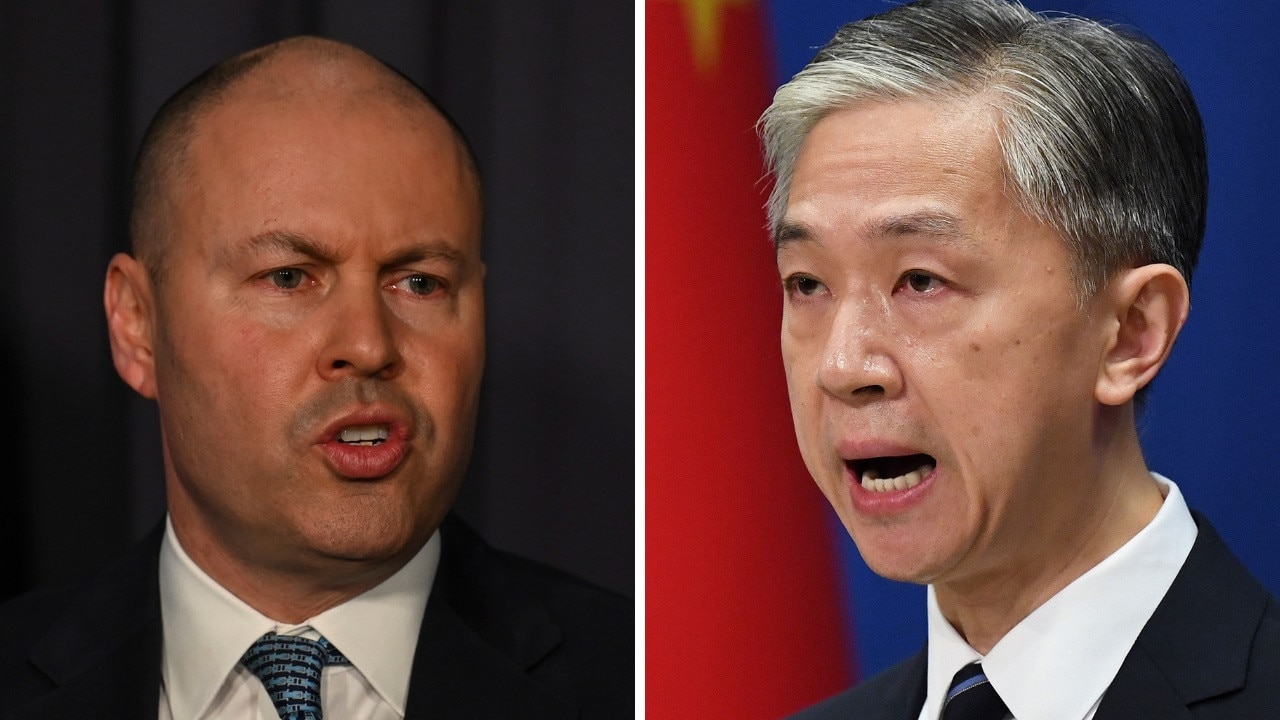China has slammed Australia and accused Canberra of having a ‘cold war’ mentality over a very contentious issue.
It’s all our fault.
China’s Foreign Ministry spokesman has lashed out at Canberra, saying Australia is “unilaterally” to blame for deteriorating relations and demanded an end to “hyping” the “theory” of economic coercion.
Wang Wenbin took to the podium last night in the Chinese Foreign Ministry’s regular weekly press conference. This time Australia was in his sights.
Treasurer Josh Frydenberg had on Monday addressed China’s weaponisation of trade laws as a “major challenge”. He urged Australian businesses to diversify in order to reduce their “economic dependence” on what is arguably the world’s largest market.
Apparently, it didn’t go down all that well.
“Australia has gained huge benefits from co-operation with China and is a beneficiary of China’s development. China has never done anything that undermines Australia’s sovereignty,” a transcript of the press conference reads.
“On the contrary, Australia has taken measures that violate market principles and even bullied China by imposing unwarranted restrictions on the normal exchanges and co-operation between the two countries.”
University fellow in law at Charles Darwin University John Garrick told News.com.au Beijing is persisting with its “wolf warrior” style of hostile diplomacy, even though it has become counter-productive.
“It is counter-productive because it is ineffective and also turns nations away from China’s sphere of influence, including in both Europe and Asia and the Pacific,” he says.
Diplomatic discord
Spokesman Wang’s speech was reported on by the Communist Party-controlled, English-language China Daily which presents itself as a less tabloid alternative to the Global Times.
“Canberra told to respect facts, abandon Cold War mentality,” the headline states.
A China Daily social media post to Twitter (the use of which would send any average Chinese citizen to prison) stated deteriorating diplomatic relations were “unilaterally” caused by Canberra.
“The most urgent task now is for Australia to face up to the crux of the frustration in the relationship between the two countries,” Wang says, adding that Canberra must abandon its “Cold War” mentality.

The error in Canberra’s ways, he says, was based on “ideological prejudice”, a lack of “respect for basic facts”.
Instead, it must “view China and China’s development objectively and rationally, and truly uphold the principles of mutual respect and equal treatment”.
Mr Garrick says to expect more of this.
“The CCP is pursuing its domestic and international goals with increasing vigour,” he recently wrote for the Australian Strategic Policy Institute (ASPI).
“Following Xi’s July speech marking the centenary of the CCP, it’s clear the party will not swallow anything that undermines its interests as it ‘marches toward the second centenary goal of building China into a great modern socialist country in all respects’.”
And that means controlling the narrative.
Which is why Beijing is redoubling its effort to have its version of the truth broadcast on the world stage.
State Councillor and Foreign Minister Wang Yi on Sunday instructed international journalists to engage in “truthful and objective” coverage of Chinese affairs.
“Truthful, objective and fair stories will appeal to the people and can stand the scrutiny of history,” Wang said, adding that “professional ethics” must prevail “however the world changes”.
Counter coercion
Don’t blame Beijing for any coercion, Wang argued. It is Canberra “interfering” with the “good development momentum” between the two economies.
Despite recent attempts to put the brakes on the global steel market, China imported a record $27 billion worth of iron ore last month. Prices, despite recent fluctuations, remain high.
Iron ore is Australia’s single greatest export earner.
“The label of so-called ‘economic coercion’ can never be pinned onto China. Instead, it is Australia that stands guilty,” Wang insists.
“(Canberra) regards itself as a ‘victim’ and lashes out at China. They also formed gangs to put pressure on China, violated international law and basic norms of international relations, grossly interfered in China’s internal affairs, and harmed China’s core interests.”
It’s a long list of complaints.
But not as long as the 14 measures it last year demanded Canberra address.
Mr Garrick says its part of an ongoing effort to rewrite global law with Chinese characteristics.
“Any consensus about what constitutes ‘rule of law’ is breaking down,” he says.
“China is enabling the emergence of more illiberal political, security and economic alternatives to those traditional global organisations. And where its international-level clout has not yet changed things in its favour, China’s sway is evident at regional and subregional levels where politicians can be more easily influenced and there’s even less transparency.”
Creating a “grey zone” of uncertainty and confusion – no matter how unrealistic the argument may be – helps achieve that end.
“The unfortunate potential exists in these tensions, at least in the short- to medium-term, for the US and its allies and China to engage in a zero-sum game,” Garrick says. “This bleak ‘grey-zone’ is rapidly unfolding.”